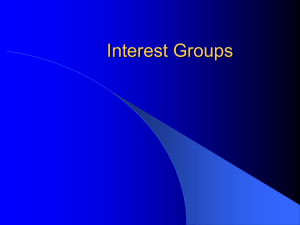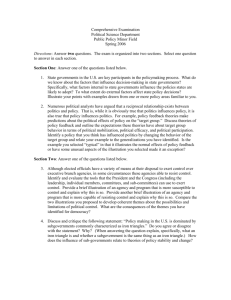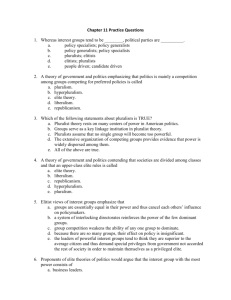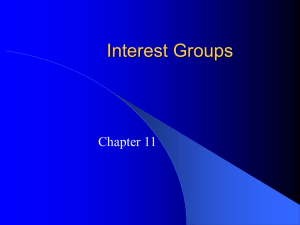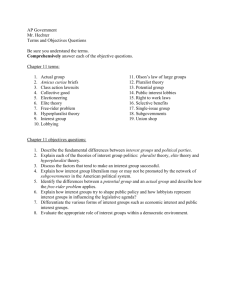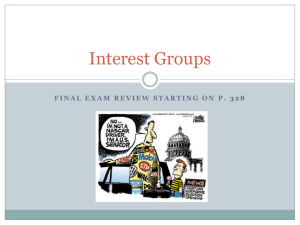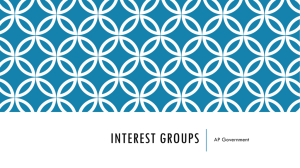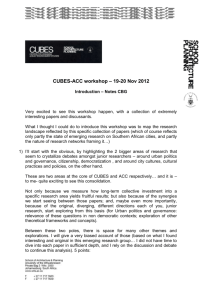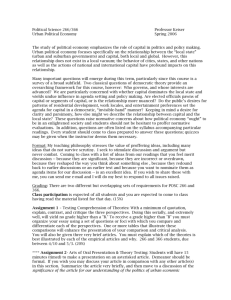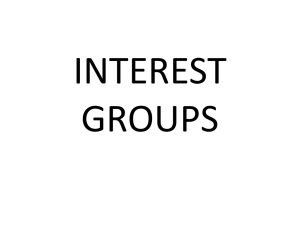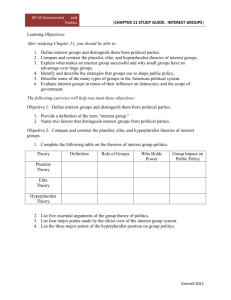Interest Groups ppt pdf
advertisement
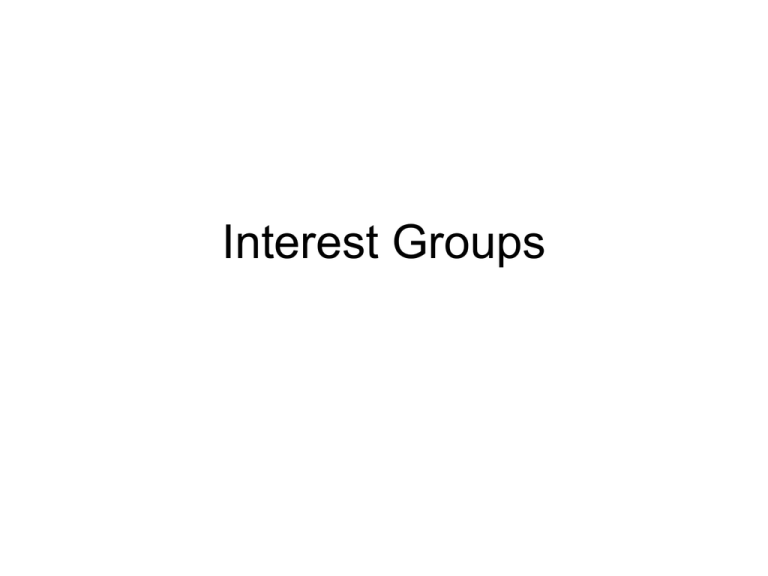
Interest Groups The Role and Reputation of Interest Groups • Defining Interest Groups – An organization of people with shared policy goals entering the policy process at several points to try to achieve those goals. Interest groups pursue their goals in many arenas. – Political Parties fight election battles, Interest Groups don’t - but they may choose sides. – Interest Groups are policy specialists, Political Parties are policy generalists. Theories of Interest Group Politics • Pluralist Theory • Elite Theory • Hyperpluralist Theory Click on name to go to that slide. Theories of Interest Group Politics - Pluralism • Definition: – Politics is mainly a competition among groups, each one pressing for its own preferred policies. – Many centers of power and many diverse, competing groups. – No group wins or loses all the time. – Groups provide the key link between the people and the government. Theories of Interest Group Politics - Pluralism • Continued – Groups provide a key link between people and government. – Groups compete. – No one group is likely to become too dominant. – Groups usually play by the “rules of the game.” – Groups weak in one resource can use another. Theories of Interest Group Politics - Elitism • Definition: – Societies are divided along class lines and an upper-class elite rules, regardless of the formal niceties of governmental organization. – Numerous groups mean nothing, power is not equally divided among them - some have much more. – The largest corporations hold the most power. Theories of Interest Group Politics - Elitism • Continued – Elite power is strengthened by a system of interlocking directorates of these corporations and other institutions. – Corporate elites are willing to lose the minor policy battles, but work to win the major policy issues in their favor. – Lobbying is a problem because it benefits the few at the expense of the many. Theories of Interest Group Politics - Hyperpluralism • Definition: – Groups are so strong that government is weakened. Extreme, exaggerated form of pluralism. – Subgovernments consist of a network of groups that exercise a great deal of control over specific policy areas. – Interest groups have become too powerful as the government tries to serve every interest. Theories of Interest Group Politics - Hyperpluralism • Continued – The many subgovernments (iron triangles) aggravate the process. – When the government tries to please all the groups, the policies become confusing and contradictory. – With more interest groups getting involved, these subgovernments may be dissolving. What Makes an Interest Group Successful? • The Surprising Ineffectiveness of Large Groups – Potential group: All the people who might be interest group members because they share a common interest. – Actual group: The part of the potential group consisting of members who actually join. – Collective good: Something of value that cannot be withheld from a group member What Makes an Interest Group Successful? – Free-Rider problem: Some people don’t join interest groups because they benefit from the group’s activities without officially joining. – The bigger the group, the larger the free-rider problem. (Olson’s law of large groups) – Large groups are difficult to keep organized. What Makes an Interest Group Successful? – Small groups are better organized and more focused on the group’s goals. – Consumer groups have a difficult time getting significant policy gains - the benefits are spread over the entire population. – Groups that can provide selective benefits can overcome this problem. What Makes an Interest Group Successful? • Intensity – Single-Issue groups: Groups that focus on a narrow interest and dislike compromise. – Groups may focus on an emotional issue, providing them with a psychological advantage. – May be more likely to use protests and other means of political participation than traditional interest groups that use lobbyists. What Makes an Interest Group Successful? • Financial Resources – Not all groups have equal amounts of money. – Monetary donations usually translate into access to the politicians - a phone call, a meeting, etc. – There is a bias towards the wealthier groups. – The wealthier groups don’t always win in the policy arena. How Groups Try to Shape Policy • Lobbying – “communication by someone other than a citizen acting on his own behalf, directed to a governmental decisionmaker with the hope of influencing his decision.” (Lester Milbrath) – Two basic types: Those that are employed by a group, and those that are hired temporarily. How Groups Try to Shape Policy – Lobbyists are a source of information. – Lobbyists can help politicians plan political strategies for legislation. – Lobbyists can help politicians plan political strategies for reelection campaigns. – Lobbyists can provide ideas and innovations that can be turned into policies that the politician can take credit for. How Groups Try to Shape Policy • Electioneering – Direct group involvement in the election process. – Political Action Committee (PAC): Used by interest groups to donate money to candidates. – PACs help pay the bill for increasing campaign costs. – Most PAC money goes to incumbents. How Groups Try to Shape Policy • Litigation – If an interest group fails in one arena, the courts may be able to provide a remedy. – Interest groups can file amicus curiae briefs in court cases to support their position. – Class Action lawsuits permit small groups of people to try and correct a situation on behalf of a much larger group. How Groups Try to Shape Policy • Going Public – Groups try and cultivate a good public image. – Groups use marketing strategies to influence public opinion of the group and its issues. – Groups will purchase advertising to motivate the public about an issue. Types of Interest Groups • Economic Interests – Labor – Agriculture – Business • Environmental Interests • Equality Interests • Consumer and Public Interest Lobbies Understanding Interest Groups • Interest Groups and Democracy – James Madison’s solution to the problems posed by interest groups was to create a wide-open system in which groups compete. – Elite theorists point to the proliferation of business PACs as evidence of interest group corruption. – Hyperpluralists maintain that group influence has led to policy gridlock. Understanding Interest Groups • Interest Groups and the Scope of Government – Interest groups seek to maintain policies and programs that benefit them. – Interest groups continue to pressure government to do more things. – But as the government does more things, does that cause the formation of more groups?
